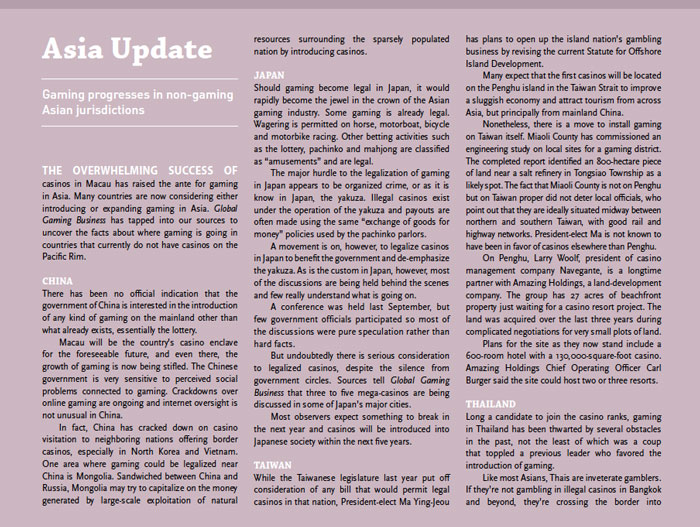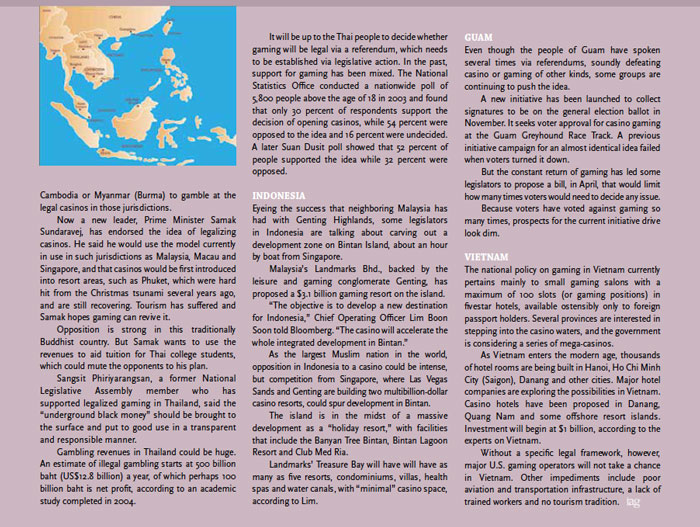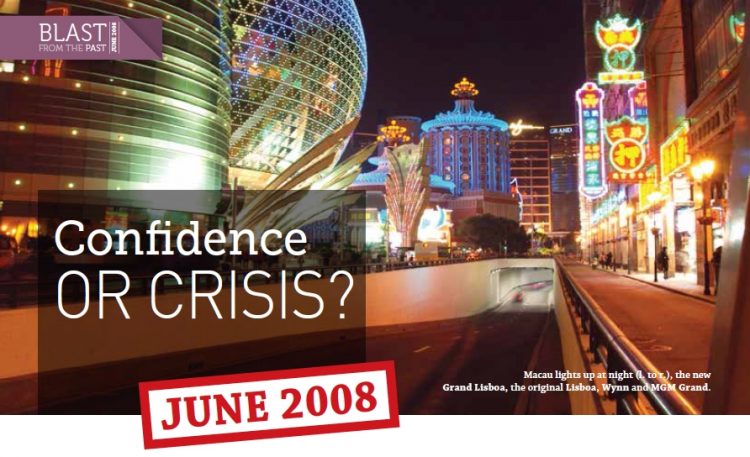Everything old is new again. We re-visit this June 2008 article in which Andrew MacDonald and Bill Eadington thoroughly analyze threats to the Macau then-boom. It makes fascinating reading in the context of the industry downturn of the last 18 months.
By Andrew MacDonald and William R. Eadington
The world has been amazed by the performance of Macau’s gaming industry since the new law was passed in 2001. That year, gross gaming revenues for Macau under the monopoly concession STDM were US$2.3 billion. For just the first quarter of 2008, they were $3.7 billion. If the current pace continues for the rest of 2008, Macau will end up with gaming revenues for the year of around $15 billion, compared to $10.3 billion in 2007. Not only has Macau officially surpassed all of Las Vegas in gaming win; Macau’s gaming revenues in 2008 will likely exceed those of the entire state of Nevada — or alternatively, the combined gaming win of America’s two largest gaming cities, Las Vegas and Atlantic City.
But that raises a question, because of the title of this article: “Macau – Confidence or Crisis.” Crisis? What crisis? How bad can things be with average annual revenue growth rates exceeding 20 percent? Yet many investors, analysts and observers are indeed concerned about what might be happening — and what might soon happen — in Macau.
The Cs
Most of the concerns of the skeptics stem from what we can call the “Cs”: Competition, Costs, Constraints (labor and infrastructure), Commission rates, Consumer profiles, Capital crunch, Credit availability, and China. The relative importance of each element in the Cs may differ from observer to observer. However, there is little doubt that all these factors are significantly contributing to a cautionary sentiment among a growing number of observers regarding Macau’s future.
Consider the related issues of competition, commission rates, credit availability and costs. The Macau gaming market can be divided into mass market play, which consists of about 30 percent of the total; and premium play, which makes up 70 percent of revenues.
The premium play or VIP market has been dramatically shaken in recent months by the efforts of certain companies to consolidate and aggregate the business of smaller junket agents under the umbrella of a larger, more powerful entity—with the smaller junket agents becoming subcontractors to the consolidators. The consolidators, as a result, gain considerably greater bargaining power relative to the concessionaires in delivering their players through their network of junket operators.
AMA International, a junket aggregation business formed by the publicly traded company A-MAX Holdings Ltd., in December 2007, was just such a vehicle.
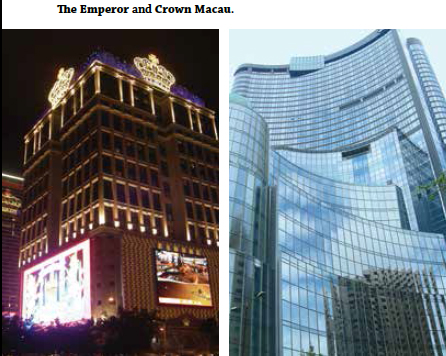
AMA International established a “partnership” with one of the concession holders, PBL Melco and the Crown Macau Casino, and reportedly has been able to extract commission rates of up to 1.35 percent of monthly rolling chip turnover volumes. As a percentage of gaming revenues, this commission rate should result in about 50 percent of the premium play win being paid to the junket aggregator, who then distributes payments to the sub-junkets.
(Not all of the contractual arrangements between concessionaires and consolidators, or consolidators and junket operators, are presently reviewable by Macau’s regulators, and none are released for public scrutiny.)
Because the government taxes gaming revenues at about 40 percent of actual win, the residual margins on such premium play are disconcertingly thin.
This commission rate is significantly higher than arrangements which existed for some time in the past in Macau, where major junket operators received commissions equivalent of about 40 percent of revenues. These were called 40/40/20 deals, or 60/40 deals for simplicity here.
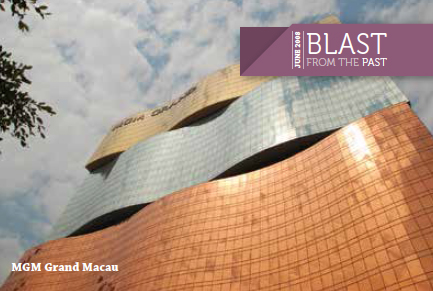
Under the 60/40 deal, the casino would retain only 20 percent of theoretical win after taxes and commissions. With the new rates (assuming no other adjustments), margins would drop to only 10 percent, not to mention the fact that the casino has to absorb the volatility risk of fluctuations in wins and losses, which at high-end baccarat can be dramatic.
Casinos — as with other businesses — can make up for thin margins if volumes are large enough to generate adequate revenues and overcome volatility, and if the contractual agreements with consolidators are sensibly structured to ensure that fixed operating overheads are covered before other obligations are met. Nonetheless, in comparison to the pre-2004 monopoly STDM and SJM days, margins have significantly eroded and competition has dramatically increased.
Reaction to this junket aggregation model in the premium play sector has been swift. Market shares among the concessionaires swung dramatically in the last few months of 2007 and early 2008 and, as would be expected, emulation and pricing pressures to match these trends have emerged elsewhere in the industry. Some concessionaires, such as Wynn and Venetian, seem to be engaging in the price war on commissions, while still suggesting that they do not have to pay premium prices for commissions due to their size, brand power and quality of facilities.
Nonetheless, the traditional 60/40 structure is increasingly evolving to a 55/45 structure — perhaps not yet meeting the market price between AMA and PBL Melco, but still reacting to these competitive changes and attempting to win back market share or prevent further player or junket operator desertion. Other companies, such as MGM, have decided so far to concentrate on the mass market, and avoid the headaches and risks of this cutthroat competition.
Competition is therefore increasingly evident among all participants in the Macau market—at the junket agent level and among casino concessionaires as they vie for new players and fight to retain existing ones.
SUPPLIER POWER
Supplier power is significant in Macau, and the major junket agents have emerged as strong and powerful suppliers of VIP customers. While the concessionaires have sought disintermediation strategies, they have had significant difficulties in dealing with customers directly — not wanting to take on the substantial credit risks as well as having to deal with complex funds transfer arrangements in China. (They may also lack the personal connections and cultural understandings that junket operators exercise.)
Furthermore, high-value customers are notoriously disloyal, and will move from one casino to another to try their luck elsewhere if they have been on a losing run or can get a better offer. An advantage for the junket operators is that they can offer their services across a number of the various concessionaires’ properties (unless, of course, they have signed an exclusive deal, as with PBL Melco and AMA).
Commission rates in Macau have therefore risen in recent times, eroding margins and putting pressure on competitive responses. Pricing is often considered a “low-level strategy” due to the ease of replication. This apparently is the case in Macau, where supplier power in the hands of the junkets has made them a very strong force with which to contend.
As they become even more powerful, the Macau SAR government and regulators may be forced to consider ways of gaining control over them.
Commission rates cannot go much higher. At the extreme, the maximum that the commission rate could be extended on the non-negotiable chip program would be somewhere between 1.42 percent and 1.62 percent. Any commission rate above that range creates a situation where baccarat players as a group, betting on any combination of player and banker (but not ties), would not generate enough losses to cover the commission rates and the tax obligations. For commission rates above this range, the casino concession holder would be losing money on every banker or player wager.
On a revenue-sharing basis, recent Macau street talk suggests that SJM may be offering a 45/55 structure to certain junket operators who then agree to cover all operating costs, leaving SJM with only about 5 percent of gross revenues after paying taxes and levies. In such an instance, SJM would bear no direct costs and would act as an intermediary only (effectively acting as a landlord for their VIP rooms).
Their thus-residual share of gaming win would have to cover the cost of capital and maintenance of their casino facilities, as well as any remaining returns on investment. Realistically, when margins get this thin, other contractual arrangements would be necessary to ensure the financial viability of the concessionaire’s casino. It is not hard to see how some operations — either through lack of volume, bad luck in the volatility arena, or an inability to come to survival terms with junket aggregators — may indeed fall by the wayside in the competitive Macau marketplace.
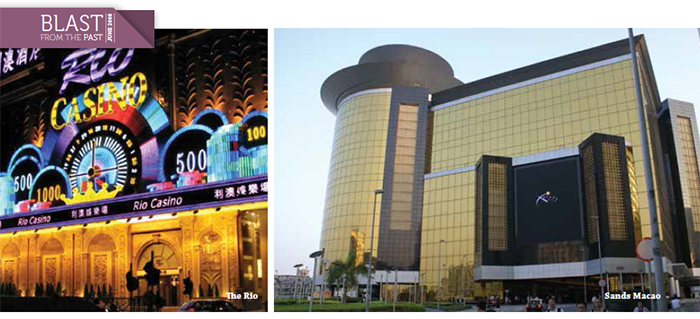
Competition, Credit
Related issues to commission rates are competition and credit availability. Significant cutthroat competition among different junket aggregators and consolidators might emerge as such organizations compete to sign up the most profitable junket operators — those with access to the biggest players — to meet their monthly targets.
To attract the biggest players, many junket operators extend credit facilities to players. If their contracts call for rolling chip turnover targets each month, the junket operators may over-extend such facilities, especially to new or high-value players, in attempts to secure higher business volumes.
While the casino concessionaires are presently somewhat insulated from the consequences of such activity, there is a real prospect of a “bubble” in VIP revenues occurring as a result. This is particularly relevant in times of general economic uncertainty or distress, where some players may gamble beyond their means in attempts to cover their losses from financial markets or from their own businesses.
Furthermore, pressure may be exerted on some concessionaires to extend credit to junket operators or even consolidators to continue to fuel the growth in volume at the baccarat tables. Thus, while credit risk for concessionaires seems to be relatively insignificant at present, the prospect of a shift in credit risk from junket operators to concessionaires could result in increased bad and doubtful debts coming onto the concessionaires’ books. Once again, this raises concern among investors, analysts and other outside observers.
It is also worth noting that the recent activity of the junket aggregators has been fueled to some extent by the liquidity brought into the system from stock market listings on the Hong Kong exchange. This has enabled junket aggregators with access to public equity to be more liberal with credit and capture the business of subjunkets by offering higher commissions and also extending their balance sheet assets to these groups.
In such circumstances, the sub-agents are able to offer credit with less rigorous principles governing their lending decisions. The growth of the junket aggregator model beyond AMA International and other players already in the game may be limited in the near term by current economic conditions and a lack of market for any further IPO listings at the present time. Nevertheless, these competitive responses not only demonstrate the dynamic of the Macau VIP market, but also suggest continued volatility in market share of the VIP sector.
Costs and Constraints
The fourth “C” in this group is costs. Commission-related expenses and prospects of bad debt are not the only costs that are increasing in Macau. Labor costs have increased substantially over time, as have the costs of many other inputs into the integrated resort casino business.
Furthermore, rising prices for steel, cement and sand have driven up construction costs for Macau’s mega-casinos under construction. These inflationary pressures are part of a global phenomenon, related at least in part to increasing oil prices and the demands on capital due to rapid economic growth in China, India and other Asian economies. Such cost increases are pushing up the capital outlays required for various pipeline projects in Macau, and are dampening the expected returns on invested capital.
This leads us to constraints. The major constraints impacting Macau are those on labor and infrastructure.
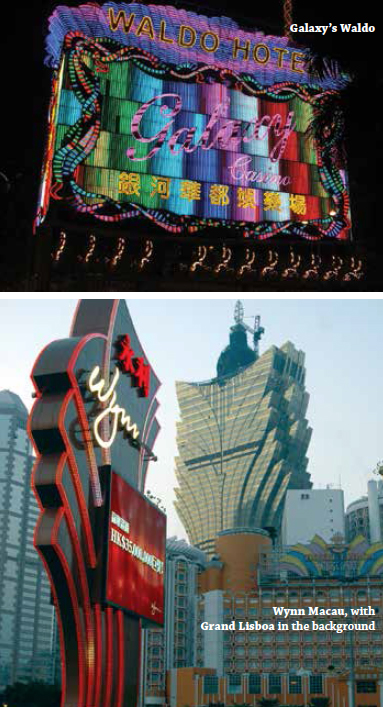 One issue surrounding labor is the protectionist stance taken by the Macau SAR to protect its own constituents from imported lowcost labor from China and elsewhere in the region. This has led to the circumstance where, by law, only Macau citizens can be employed as staff working on the casino floor by the concessionaires.
One issue surrounding labor is the protectionist stance taken by the Macau SAR to protect its own constituents from imported lowcost labor from China and elsewhere in the region. This has led to the circumstance where, by law, only Macau citizens can be employed as staff working on the casino floor by the concessionaires.
While initially this was seen as a positive for the Macau population, it has meant that a relatively small and static Macanese population of less than half a million has had to cope with a burgeoning casino industry over the past few years. The unintended consequence of this has been to relegate Macau citizens to base-level dealing jobs within the casino sector (where demand is strongest) while inhibiting opportunities for promotion (because such workers cannot be legally replaced with non-Macau citizens).
This has undermined staff loyalty and increased movement among concessionaires by gaming staff. Furthermore, with a limited pool of available labor and demand for casino staff being so high, various other sectors in the Macau economy have been confronted with significant upward pressures on wages and other costs of doing business.
There is also the question of how these changes in the local labor market impact the social fabric of Macau in the long term. Many young people in Macau are being attracted into the casino sector and away from either continuing their education or entering public service-related fields.
While the concerns to the investment community are more isolated to the increased cost of labor and its limited availability for casino operations, the broader issues for Macau have relevance at both the policy and political levels. What may result is a legislated differential wage structure for Macau and non-Macau citizens, or quotas introduced that would allow a certain proportion of staff working on the casino floor to be foreign workers.
Given the pipeline of capital projects presently under way, along with the expected future levels of operations in the casinos and other tourist-related businesses, the need to permit more foreign workers into Macau is already an issue whose importance can only increase in the next several years. Thus, the policies chosen that will affect the cost and availability of labor in the Macau SAR will have a major bearing on the industry structure in the future.
Yet another constraint that may well limit the prospects of Macau in the near future is infrastructure. The infrastructure in Macau has lagged the development of the casino industry and the ever-increasing number of visitors to Macau. The airport and ferry terminals both require physical expansion as well as enhanced servicing by customs and immigration personnel to cope with the numbers coming into Macau. Taxi services are another aspect of Macau that has been under pressure, as has been the road system in general.
Dramatic upgrades to critical support services are required if Macau is to one day host more than 50 million visitors a year, as is expected. While much infrastructure expansion and improvement is under way, the intra-Macau transport situation is lagging behind the development of the major resorts, and must be escalated in priority. As with Las Vegas, it is possible that Macau may be heading to a situation where gridlock occurs far too frequently at peak demand periods.
Consumer Profile
Another concern in the minds of some is the current consumer profile. The growth in the VIP market has been astounding, and it has so far overshadowed the growth exhibited in the mass market. In market share terms, VIP baccarat revenues accounted for around 70 percent of gross revenues in the first quarter of 2008. Since margins for the VIP sector are so much thinner than the mass market sector, this may not be a good sign for investors.
Possibly a greater source for worry, however, is the issue of massmarket retail, an important part of the so-called non-gaming spend. In recent years, the percentage of revenues in the largest Las Vegas Strip casinos coming from non-gaming sources has climbed to 60 percent or higher for many properties.
Much of the new Macau and the Cotai Strip in particular has been built on the prospect that mass-market retail spending patterns would mirror the Las Vegas Strip’s recent experience, and would be complementary to a substantial gaming spend. There is little doubt that some of the high-end retail offerings in Macau are doing exceptionally well, based on reported sales; various high-end retailers have indicated that their Macau-based retail stores now rank among their top 10 outlets globally, based on sales revenue performance.
However, there remains a concern that the mass-market gaming customers are not purchasing much from mid-level retail outlets that have recently opened. In other words, it might be the case that the mass-market visitors to Macau are — and will remain — far more gaming-centric in their motivations to visit Macau than their Las Vegas counterparts.
While some of the mid-level retail stores may benefit from initially favorable lease terms in the short term, they will face challenges in the long term if mid-level retail consumption does not increase. Many of the business models for integrated resort casinos in Macau are predicated on selling off retail assets into trusts. However, with the disappointing consumer demand for retail, along with the soft capital markets of 2008, such strategies are now being questioned, and plans for listed trust offerings are being deferred into the future.
The capital crunch that is sweeping the world has resulted in a number of projects in Las Vegas being postponed or cancelled. No projects in Macau have so far come into direct question, but investor uncertainty has once again led to a postponement of the planned IPO of SJM. It will also be interesting to see if any of the planned projects outside of the hands of the six direct concessionaires will continue to move forward.
Changing sentiment around Macau may indeed bring some of these projects into question over the near term. The financial assumptions on which these projects were sold to the market in many cases will need to be reassessed in light of the realities brought about by recent changes in Macau.
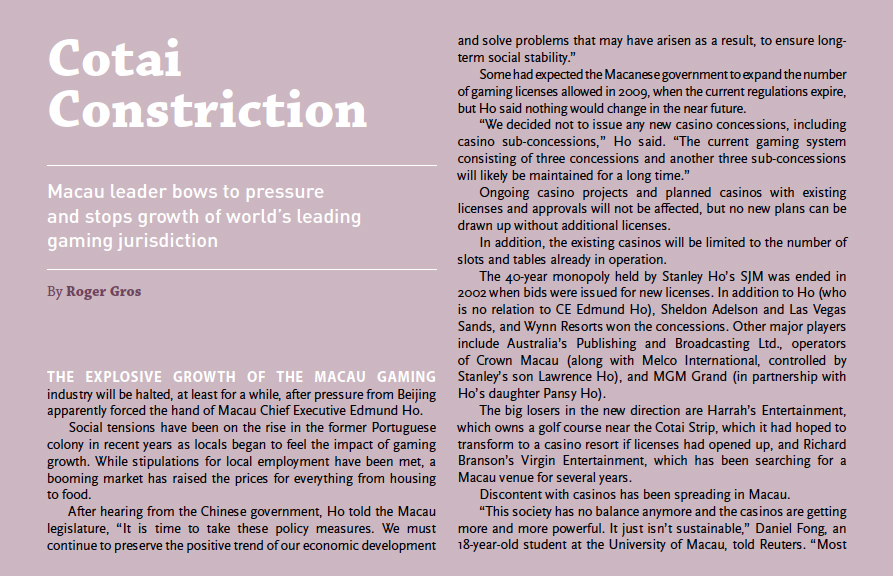
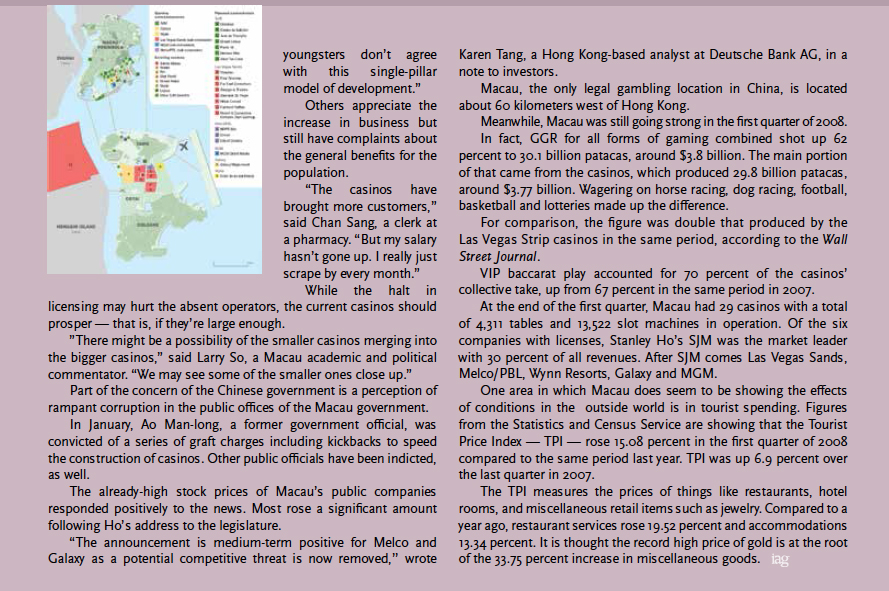
The Big C
Finally, there is the big “C” — CHINA. The authorities in Beijing have overseen the growth of Macau and the success of its developments with a “light touch” to date. China wants to show the world (and Taiwan) that the one country — two system approach can indeed be successful. The Olympics in Beijing — opening superstitiously on the eighth day of the eighth month in 2008 — is probably also a factor in their benign treatment of Macau, along with the fact that Macau allows China to contain gaming to an easily controlled single location while quietly evaluating their long-term options.
Many Asian governments have been looking at the success of Macau (and the orderliness of the Singapore integrated resort casino process) and considering how they might perhaps harness the casino economic engine for themselves. That might ultimately be the case for China itself, where it could harness the economic power of integrated resorts with casinos to regenerate other deprived areas of China, perhaps in the north of the country, or near Shanghai.
On the other side of the argument for Chinese gaming expansion, there are undoubtedly concerns over social costs associated with expanding the presence of casinos in Chinese society. Macau might end up being seen by mainland China as a net importer of economic benefits for itself but an exporter of social costs to the rest of China.
The extent to which social costs — such as political corruption, the fallout from excessive gambling, and loan-sharking activities — visibly exhibit themselves on the Chinese mainland may have a direct impact on Beijing’s attitudes and policies relating to the individual visit scheme or the direct movement of funds between China and Macau.
Harkening back to the more liberal extension of credit by junket agents, it may turn out that the reckless extension of credit and cutthroat competition for players and junket operators may have long-term negative consequences for Macau if Beijing concludes it must react to protect its citizens.
The point at this time is that no one knows for sure what Beijing may be thinking for the long term, or what levers they may want to pull to rein in the runaway growth and economic dynamic of Macau. There are a number of issues that may arise if concessionaires and junket operators act in ways that invite negative reactions by China in these regards. Short-term gains may result in longer-term pain if appropriate regulatory and operational policies are not implemented and followed.
The aggregate of all of these concerns culminated in announcements made by Edmund Ho, the Chief Executive of the Macau SAR, before the Macau legislature on April 22. He proposed that there should be no new gaming concessions given beyond the six that already exist, that no additional land should be permitted for casino development beyond what is already in the pipeline with existing concessionaires, that controls should be imposed restricting non-concessionaires from operating casinos, and that junket commission rates should be regulated.
He also indicated that these directives were in accordance with the wishes of Beijing. Whether these actions will indeed stabilize the rapidly evolving dynamic of Macau remains to be seen, but this action does point out that it is not just the analysts and investors who have gotten nervous.
Confidence or crisis? Confidence in Macau readily arises from the amazing successes achieved to date. It is a tiny city-state that has quickly transformed from a sleepy backwater into a thriving entertainment center with billions being invested in magnificent resort developments. It has gaming revenues that continue to outstrip even the most bullish analyst estimates. Macau’s visitor numbers continue to surprise and astound observers.
There is no crisis yet — but the emerging issues discussed above should not be overlooked. Turbulence and headwinds may very well characterize Macau’s competition in the short term and disturb the surprisingly positive trends that have emerged to date. However, there are increasing signs that the recent overexuberance in Macau’s prospects may indeed lead to disappointment for some investors, and disillusionment for policy makers.
It may be time for greater caution, and to reflect upon what lessons may be learned from the congruence of factors presently swirling around Macau. Indeed, Chief Executive Ho’s directives suggest that is likely to be the present course. In the long term, the burgeoning Chinese middle class will likely ensure Macau’s success, as long as the partners in Macau’s gaming industry — government, regulators, concessionaires and junket agents — all recognize and appropriately respond to the issues and challenges that arise
Reprinted with permission of Global Gaming Business.
